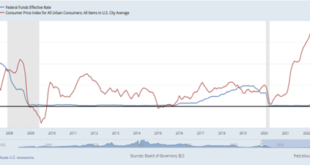Economic growth in the United States accelerated to a 2.4 percent annualized rate in the second quarter of 2023, picking up from 2.0 percent in the first quarter, and climbing well above the 1.8 percent rate predicted by economists. Many analysts are surprised that the US economy has continued to expand at a robust pace despite the Federal Reserve’s (Fed) aggressive tightening on monetary policy. The Fed raised interest rates by more than 500 basis points (bps) since...
Read More »CBDCs: The Ultimate Tool of Financial Intrusion
While the government promotes CBDCs as tools for "inclusion," it is more likely that they will be another vehicle for federal intrusion. Original Article: "CBDCs: The Ultimate Tool of Financial Intrusion" [embedded content] Tags: Featured,newsletter
Read More »Updating Böhm-Bawerk and Fixing Finance
Peter Lewin joins Bob to discuss his work with Nicolás Cachanosky on uniting Austrian capital theory with mainstream finance. Peter's New Book on Capital and Finance: Mises.org/LewinBook Updating Böhm-Bawerk and Fixing Finance Video of Updating Böhm-Bawerk and Fixing Finance Join us in Nashville on September 23rd for a no-holds-barred discussion against the regime. Use Code "HA23" for $45 off admission:...
Read More »Understanding Hegel from a Straussian Viewpoint
This book offers an account of Hegel that will surprise many readers—at least it surprised me. The political philosopher Leo Strauss often criticized “historicism,” the view that human beings do not have a fixed nature or essence. Instead, as José Ortega y Gasset put it, “Man, in a word, has no nature; what he has is—history.” G.W.F. Hegel was one of the foremost historicists, so you might expect Strauss to attack him. But, although he does suggest that Hegel’s...
Read More »The Unwelcome Return of Covid Restrictions and Lockdowns
The covid restriction machinery is being ramped up in time for fall, despite the fact that covid poses little danger. Original Article: "The Unwelcome Return of Covid Restrictions and Lockdowns" [embedded content] Tags: Featured,newsletter
Read More »How a CBDC Created Chaos and Poverty in Nigeria
It is no coincidence that Nigeria, with a population of over two hundred million, became the first serious global testing ground for central bank digital currencies (CBDC) implementation. Not only is it the wealthiest country on the continent where the globalists are making plans, but Nigeria also possesses significant hydrocarbon and metals reserves and talented citizens. For these reasons, it can serve as a relatively good example for the rest of the poorest...
Read More »Beating Woke Capital on the Market
Matthew Mohlman joins Good Money with Tho Bishop to discuss his work with Monument Ventures. Matthew and Tho discuss the need to build better alternatives to woke financial institutions, and the limit of political solutions to address the problem. Join Bob Murphy, Patrick Newman, Jonathan Newman, and Murray Sabrin in November for a Mises Circle in Ft. Meyers, FL on The White House, the Fed, and the Economy. Use promo code Tampa23 for $10 off registration. Matthew's...
Read More »What the Left and Right Get Wrong On China
On this episode of Radio Rothbard, Ryan McMaken and Tho Bishop talk about the Chinese economy. While some of the left see China as a model for governing, those on the right often assume their rise relative to the US is inevitable. Ryan and Tho look at the recent challenges to the Chinese economy. Recommended Reading "The Chinese Economy: Market Socialism with Chinese Characteristics" by Antonio Graceffo: Mises.org/RR_149_A "China Enters the Doom Loop" by...
Read More »How Conscription Ended Fifty Years Ago
For the past fifty years, the US has not had a military draft. Unfortunately, the end of conscription did not mean US military interventions abroad ended. Original Article: "How Conscription Ended Fifty Years Ago" [embedded content] Tags: Featured,newsletter
Read More »What the Central Bank Cartel has Planned for You
The Austrian(TA): What is the global currency plot, and who benefits most from the success of this effort? Thorsten Polleit (TP): The global currency plot denotes a rather inconvenient truth: the existence of states (as we know them today) sets into motion a dynamic process toward creating a single world fiat money controlled by a world central bank, and most likely a central world government. The beneficiaries will be the very few—the “elite”—in charge of running...
Read More » Swiss Economicblogs.org
Swiss Economicblogs.org



